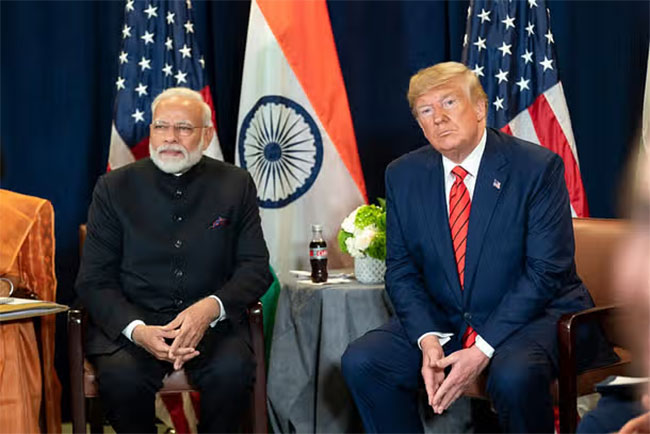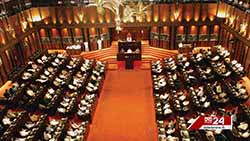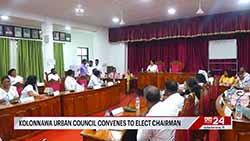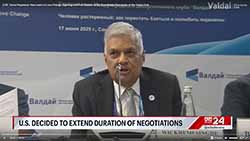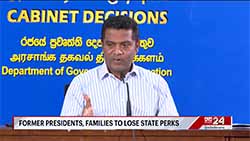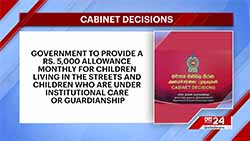India won’t accept third-party mediation on Kashmir, Modi tells Trump
June 18, 2025 08:36 pm
Indian Prime Minister Narendra Modi has told US President Donald Trump that Delhi will never accept third-party mediation with Pakistan on the issue of Kashmir, India’s senior-most diplomat said.
Foreign secretary Vikram Misri said that Modi “strongly” conveyed India’s long-held stand to Trump during a phone call between the two leaders on Tuesday.
Trump has repeatedly offered to mediate between India and Pakistan to solve the “Kashmir issue” since a four-day conflict between the nuclear-armed neighbours in May.
The White House has not commented on India’s statement.
Mr Misri also said that Modi told Trump “clearly” that during the duration of the conflict, “no talks were held at any level on the India-America trade deal or on the mediation between India and Pakistan by America”.
Trump has repeatedly claimed that India and Pakistan ended the conflict after a ceasefire brokered by the US and also that he used trade as a lever to make them agree. Pakistan has backed US claims of brokering the ceasefire but India has denied it.
“The talks regarding cessation of military action were held directly between India and Pakistan under the existing channels established between both militaries,” Mr Misri said.
Last month, Trump told reporters: “I said, ‘Come on, we’re going to do a lot of trade with you guys [India and Pakistan]. Let’s stop it. Let’s stop it. If you stop it, we’ll do a trade. If you don’t stop it, we’re not going to do any trade.’“
Delhi is rushing to negotiate a trade deal with the Trump administration before a 90-day pause on higher tariffs ends on 9 July.
Kashmir is a contentious issue for both India and and Pakistan, who claim the region in whole, but administer it only in part. Bilateral talks over several decades have not led to any resolution.
India treats Kashmir as an integral part of its territory and rules out any negotiation, particularly through a third party.
Tensions escalated between the South Asian neighbours after India blamed Pakistan for a 22 April attack on tourists in Indian-administered Kashmir in which 26 people, mainly tourists, were killed. Islamabad denied the charge.
In May, India carried out air strikes on what it called terrorist infrastructure inside Pakistan, leading to four days of intense military action from both sides of the border.
Both countries accused each other of targeting airbases and other military sites.
As the conflict between the two nuclear-armed nations threatened to escalate further, Trump announced on 10 May that India and Pakistan had agreed to a “full and immediate ceasefire”, brokered by the US.
Later, in a post on Truth Social, he said: “I will work with you both to see if, after a thousand years, a solution can be arrived at, concerning Kashmir.” (The Kashmir issue only dates back to 1947).
A statement by US Secretary of State Marco Rubio the same day said that the two countries had also agreed “to start talks on a broad set of issues at a neutral site”.
On 11 May, Trump repeated praise for India and Pakistan’s leaders for understanding it was “time to stop the current aggression”, adding that he was proud the US “was able to help you arrive at this historic and heroic decision”.
After Trump’s statement on the ceasefire, Pakistan’s foreign minister said the agreement had been reached by the two countries, adding that “three dozen countries” were involved in the diplomacy.
India has, however, consistently denied any intervention by the US.
Analysts say Trump’s very public statements on offers of mediation over Kashmir have tested Delhi’s red lines on the issue.
Delhi has always encouraged its Western partners not to treat India and Pakistan as equals.
It also discourages western leaders from undertaking visits to India and Pakistan at the same time.
But Trump’s tweets often hold India and Pakistan as equals. This has caused some discomfort in Delhi’s diplomatic circles but analysts believe it’s too early to say whether this will affect ongoing trade deal talks between Washington and Delhi.
Source: BBC
--Agencies



